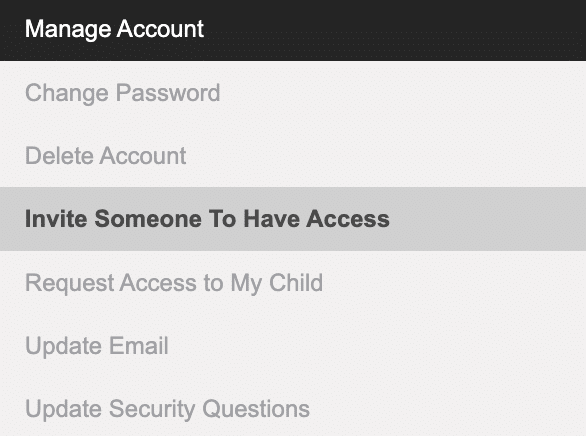If you are confused about accessing a family member’s medical record or even how to give family members access, you are not alone. The standard for medical records is between a patient and their provider. Giving another family member access is not automatic for any office or hospital. However, there are several reasons families need shared access to medical information.
- Older adults asking an adult child or hired an advocate for help
- Life-altering moments impacting mental or physical capabilities
- An adult child living with a disability or condition needing support
- An adult child living out of state helping transition an older adult from hospital to home
- Someone preparing for surgery
- An older adult wanting a friend’s help at medical appointments
- A spouse or friend living with an advancing illness or condition
- Child turning 12 or older, depending on state laws
Proxy access means giving shared access to your or another person’s medical records. It does not mean granting medical decision-making power when applied in the context of patient portals. The experience of obtaining proxy access in the United States varies greatly. This article will share why giving access matters, stories from others, helpful tips, and a future solution to make sharing health information easier on families.
Why do sharing medical records matter?
More and more families seek proxy access because more of our health information is available online. However, our health information is not always available in one place or to every healthcare provider we see. This is often why families begin medical binders. By default, our health information is shared only if requested by someone. This creates delays in getting timely information that impacts care and cost for patients and the families who support them. This is why many families, who regularly interact with healthcare, keep medical binders to have the answers the moment the healthcare provider asks.
When family caregivers are not given easy access to health information about their family members, they are kept in the dark about what is happening and why. When kept in the dark, families often find themselves spending increasing time:
- Calling the doctor’s office with questions.
- Making follow-up appointments to ask questions.
- Taking family members to urgent care or ER.
- Seeing a variety of healthcare providers and services for help.
Stories of sharing access to medical records
OpenNotes is the international movement that advocates for transparent communication in healthcare and studies the effects of shared notes in patients’ records. They held a webinar, Disconnections & Dead Ends: Fixing Proxy Access, to highlight two stories of gaining proxy access for a spouse and a doctor helping aging family members. Proxy access is the term used when describing how parents, legal guardians, and caregivers can access a patient’s health information via the growing number of patient portals.
Story 1: A wife wants to give proxy access to her husband for an upcoming surgery
Liz Salmi shares the complicated path of what it was like to share access with her husband and care partner, Brett.
While Liz does not advise the hack they used, she sometimes recognizes that sharing usernames and passwords is the quickest way to give access. Listen to Liz’s story.
Story 2: Dr. David Dorr helping aging family members with their health
An internal medicine doctor and Oregon Health & Science University Chief Research Information Officer, Dr. David Dorr, found himself helping two aging family members. Listen to his experience of how different gaining proxy access was for an aunt and his mother.
Tips on Accessing Medical Records of Family Members
While you can request paper medical records, proxy access via patient portals offers families a way to receive alerts about upcoming appointments and access to view labs, images, and past visit notes and easily communicate with the healthcare team. This article will discuss how to get or give proxy access via patient portals.
To begin, start with the patient portal and look for a menu or settings option that allows the patient to give someone access. Look for places in the portal labeled Sharing or Managing Account settings and preferences.


The biggest tip for success is to do this with the person on the phone or nearby, as you will want to make sure they receive the invite, know the correct date of birth, and any access codes created. Expect to enter the family member’s name and email and possibly create or share an access code.
What do I do if the family member cannot grant me proxy access easily?
If you or the family member does not yet have a patient portal or you cannot figure out how to guide your 82-year-old dad through these steps over the phone, the next step is to call the office or hospital to explain:
I need shared access to my family member’s patient portal to help them. Whom do I speak with to get proxy access?
If the patient can communicate, call when they are available to three-way with the office so that they can give verbal consent to the office, especially if you are not already listed on their medical record information release (HIPAA) form. In cases where the family member has a condition that impacts their verbal or cognitive abilities, start your call by asking how to get the legal paperwork around guardianship or healthcare power of attorney to facilitate smoother proxy access.
Lastly, as Dr. Dorr mentioned, the front-line staff may not have the needed training to help you get to the correct department or person to make Proxy Access happen. This will take a lot of patience and persistence to figure out how to speak with the right person who can help.
For effective care coordination, home self-management, we need to engage the whole team – including the person and their care partners, especially for older adults and those with multiple chronic conditions.
– David Dorr, MD, MS
Oregon Health & Science University
A Future Solution for Managing Proxy Access: Your Family’s Medical Homebase
In 2020, Primary Record began speaking to individuals who kept medical binders on behalf of kids with rare diseases, caregivers of aging parents, and cancer survivors. Even with proxy access, they found the need for a medical binder or some system to pull all their health information into one place. From printing out the visit notes from various portals, handwritten medication lists, and spreadsheets of labs and providers, families spoke about the significant amount of time maintaining health information so that it’s ready and able to share with their care team and family.
Primary Record works directly with families to understand the challenges and solutions they need. The trend has shown that one payor or large electronic health vendor will not solve all of the problems families face, even in the era of more accessible health information for patients. How can solutions for families happen when these more prominent players are also asked to solve the challenges of specialty providers, lab, billing, and medical record departments? Zeroing in on the needs of families has allowed Primary Record the freedom to innovate solutions we all want for our families – a homebase to search the critical information about our health the moment we need to share.
In the future, Brett and Liz can create a Primary Record account. They can quickly turn on and off shared access to help manage health information with each other. They can search and select multiple patient portals to pull in data, as shown at Primary Record today. Brett could invite a private patient advocate into their portal or use the help of other family members if he needed support to best help Liz. In addition, Liz and Brett’s care team will have a place to make notes, search, store documents, and link their health data to help their family and care team understand the reasons, preferences, and wishes around their care.







